
Magento 2 Dynamic Pricing Extension: Features and Top Options
Want to take control of your pricing strategy and increase sales? Magento 2 dynamic pricing extension revolutionizes online retail by offering tailored pricing strategies.
In this article, we will explore the features, benefits, and top Magento 2 dynamic pricing extensions.
Key Takeaways
-
Discover how Magento 2 Dynamic Pricing Extension can enhance your pricing strategy.
-
Learn about the features of dynamic pricing, including personalized pricing and tiered pricing.
-
Explore the top Magento 2 dynamic pricing extensions, such as Amasty's advanced product options.
-
Understand who can benefit from using the Magento 2 dynamic pricing extension.
-
Find out the benefits of Magento 2 Dynamic Pricing Extension, including optimizing revenue and profitability.
What is Magento Dynamic Pricing Extension?
Magento Dynamic Pricing Extension is a tool used for Magento stores. It is designed to enhance the pricing functionality.
It allows online merchants to use dynamic pricing strategies in their Magento stores.
Dynamic pricing for Magento 2 refers to adjusting the total price of the product based on various factors. These factors include:
-
Demand
-
Competition
-
Inventory levels
-
Customer segmentation
-
External factors like time of day or seasonality.
It enables merchants to offer personalized pricing to different customers. It also helps them optimize pricing to maximize revenue or profit.
Features of Magento 2 Dynamic Pricing Extension
1. Rule-Based Pricing
It enables merchants to create highly customizable pricing rules. These rules will be tailored to their specific business needs. They can set rules to offer discounts based on:
-
Cart subtotal
-
Product attributes (such as color or size)
-
Customer groups (like wholesalers or retail customers)
-
Order quantity.
2. Tiered Pricing
Tiered pricing allows merchants to offer discounts on bulk purchases. It encourages customers to buy larger quantities. Pricing tiers can be set where the unit price decreases as the customer purchases more items.
It incentivizes them to buy in higher volumes.
3. Customer Segmentation
It allows merchants to divide their customer base into groups. The division is based on various criteria, such as:
-
Geographic location
-
Demographics.
They can then apply different pricing strategies to each segment. It offers personalized discounts or promotions. It helps enhance customer loyalty and increase conversions.
4. Time-Based Pricing
It allows merchants to schedule pricing changes to occur at specific times or dates. They can set up limited-time promotions or flash sales. It helps create a sense of urgency and drive sales within a defined time frame.
5. Dynamic Discounts
Dynamic discounts enable merchants to adjust Magento prices in real-time. It is based on factors such as:
-
Competitor prices
-
Market demand.
Dynamic price updation helps merchants ensure competitiveness. It also maximizes sales while maintaining profit margins.
6. Geolocation-Based Pricing
Geolocation-based pricing enables merchants to dynamically calculate the prices based on the customer's location. It is particularly useful for international e-commerce businesses. It allows them to adjust prices to account for:
-
Currency conversion rates
-
Taxes
-
Local market conditions.
7. Cross-Sell and Upsell Offers
Merchants can use cross-sell and upsell offers to increase the average order value. They can recommend related or complementary products to customers. It is based on their current selections.
They can also offer bundle pricing or discounts. It incentivizes customers to add more items to their cart.
8. Integration with Third-party Systems
Magento 2 dynamic pricing extension also enables integration with other systems, such as:
-
Inventory management systems
-
Analytics platforms.
It enables merchants to synchronize pricing data and gain valuable insights into:
-
Customer behavior
-
Inventory levels
-
Sales performance.
9. Performance Analytics
Built-in analytics tools provide merchants with valuable insights. It helps them assess the performance of their dynamic pricing strategies. They can track key metrics such as:
-
Sales volume
-
Revenue
-
Profit margins
-
Customer engagement.
It helps check the effectiveness of their pricing tactics. It also helps them make data-driven decisions to optimize their strategies over time.
10. Responsive Design
The extension is compatible with Magento 2 themes and responsive design principles. It helps ensure an uninterrupted user experience across various devices and screen sizes.
It helps merchants cater to the growing number of mobile shoppers. It also maximizes conversions across all channels.
Best Magento 2 Dynamic Pricing Extensions
1. Amasty Advanced Product Options
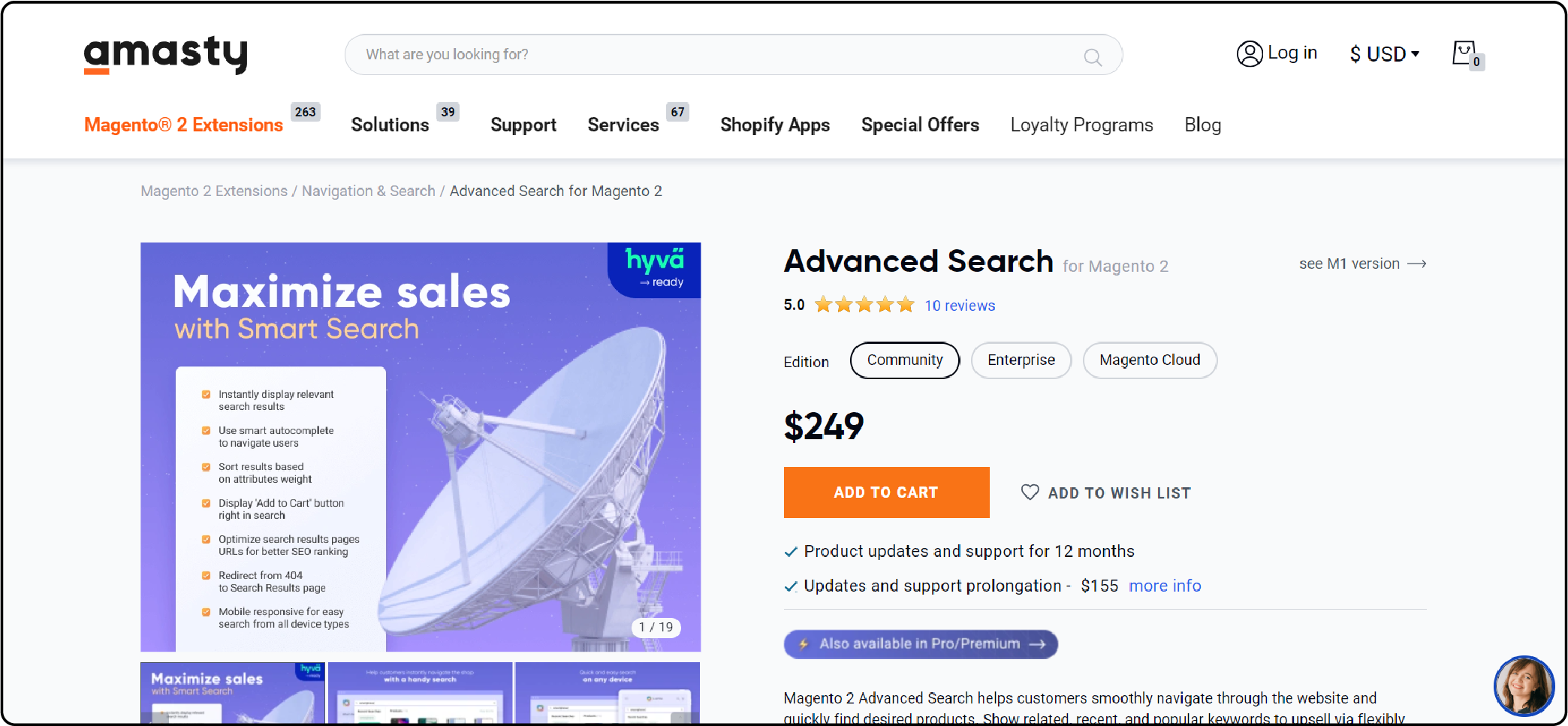
Amasty’s extension offers advanced pricing options. It allows merchants to set up:
-
Tiered pricing
-
Group pricing
-
Quantity-based discounts.
It also supports dynamic product pricing based on custom options, such as color or size.
Price:
-
Community Edition: $199 (12 months)
-
Enterprise Edition: $499 (12 months)
-
Magento Cloud Edition: $799 (12 months)
2. MageWorx Dynamic Product Options
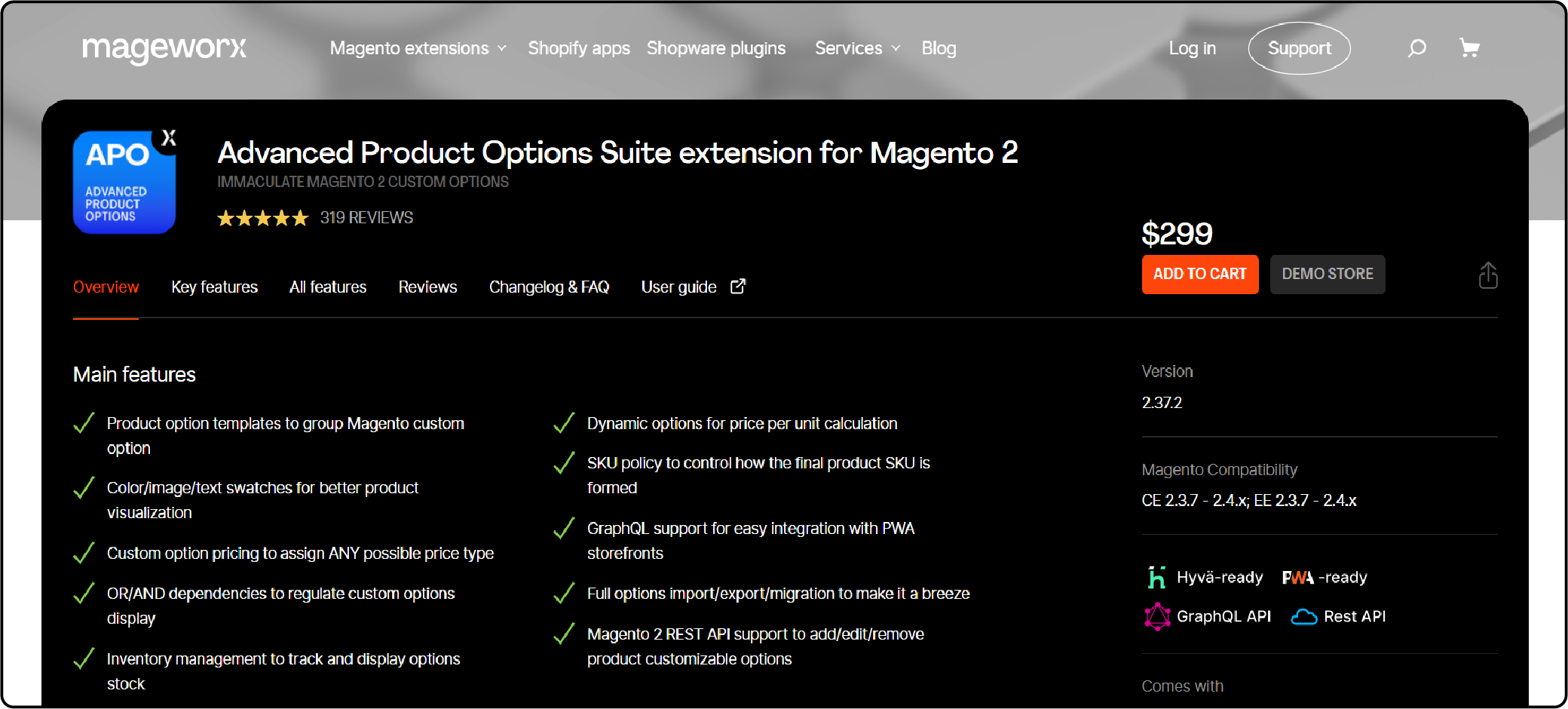
MageWorx provides a comprehensive solution for dynamic pricing and custom options management. It allows merchants to create advanced pricing rules based on:
-
Product attributes
-
Customer groups
-
Other conditions.
It also supports conditional logic for displaying or hiding custom options. It is based on user selections.
Price:
- Magento Edition: $299 (12 months)
3. AheadWorks Automatic Related Products 2
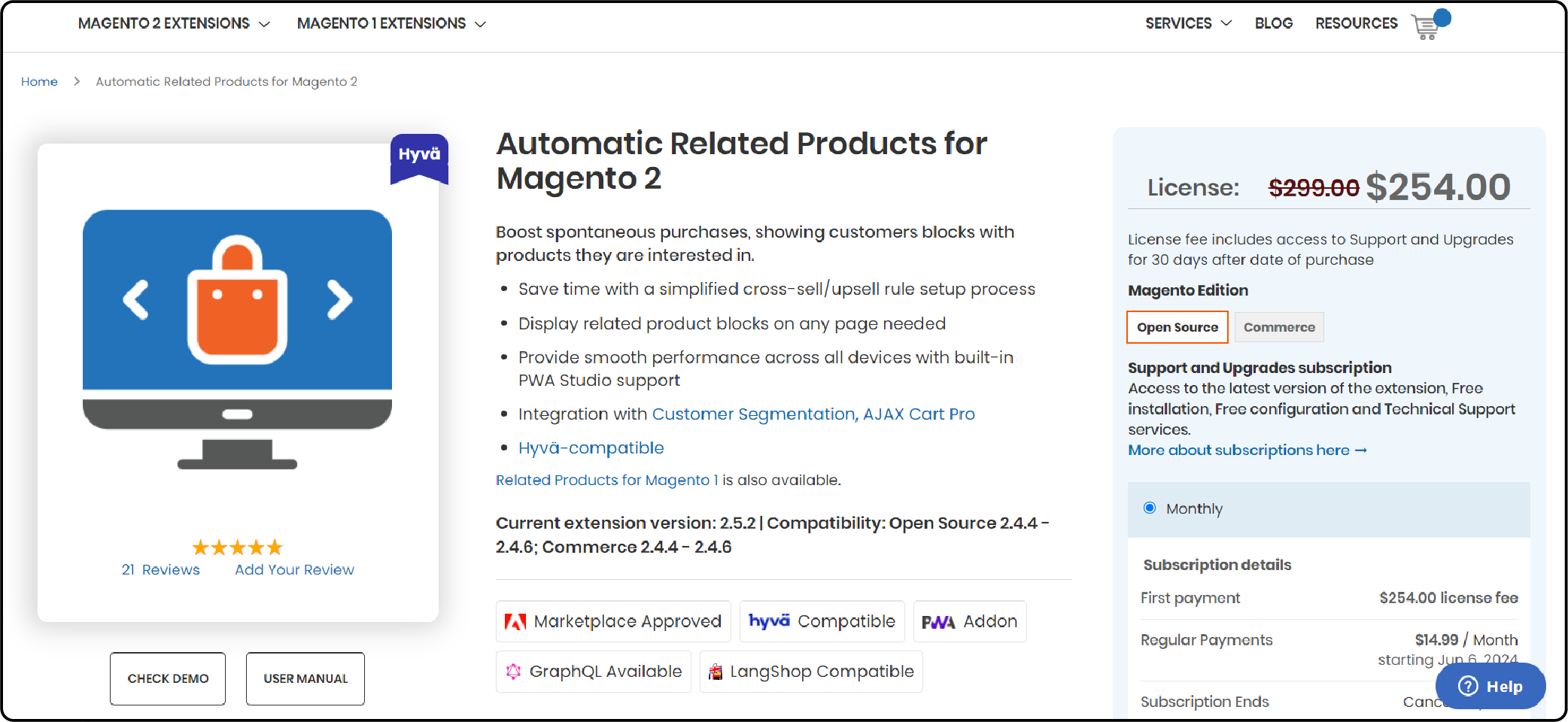
It primarily focuses on related Magento product recommendations. AheadWorks extension offers features for cross-selling and upselling. These are essential for implementing dynamic pricing strategies.
It allows merchants to create rules for automatically offering discounts or promotions. These discounts will be based on customer behavior or order history.
Price:
-
Magento Open Source Edition: $254 (12 months)
-
Magento Commerce Edition: $509 (12 months)
4. Magedelight Advanced Product Options Suite

Magedelight offers a suite of extensions for managing advanced products. It includes dynamic pricing features. Merchants can create rules to adjust price values based on:
-
Product options
-
Customer groups
-
Cart contents.
The extension also supports bulk pricing and tiered pricing structures.
Price:
-
Magento Open Source Edition: $199 (12 months)
-
Adobe Commerce Edition: $399 (12 months)
-
Adobe Commerce Cloud Edition: $499 (12 months)
5. WeltPixel Dynamic Pricing
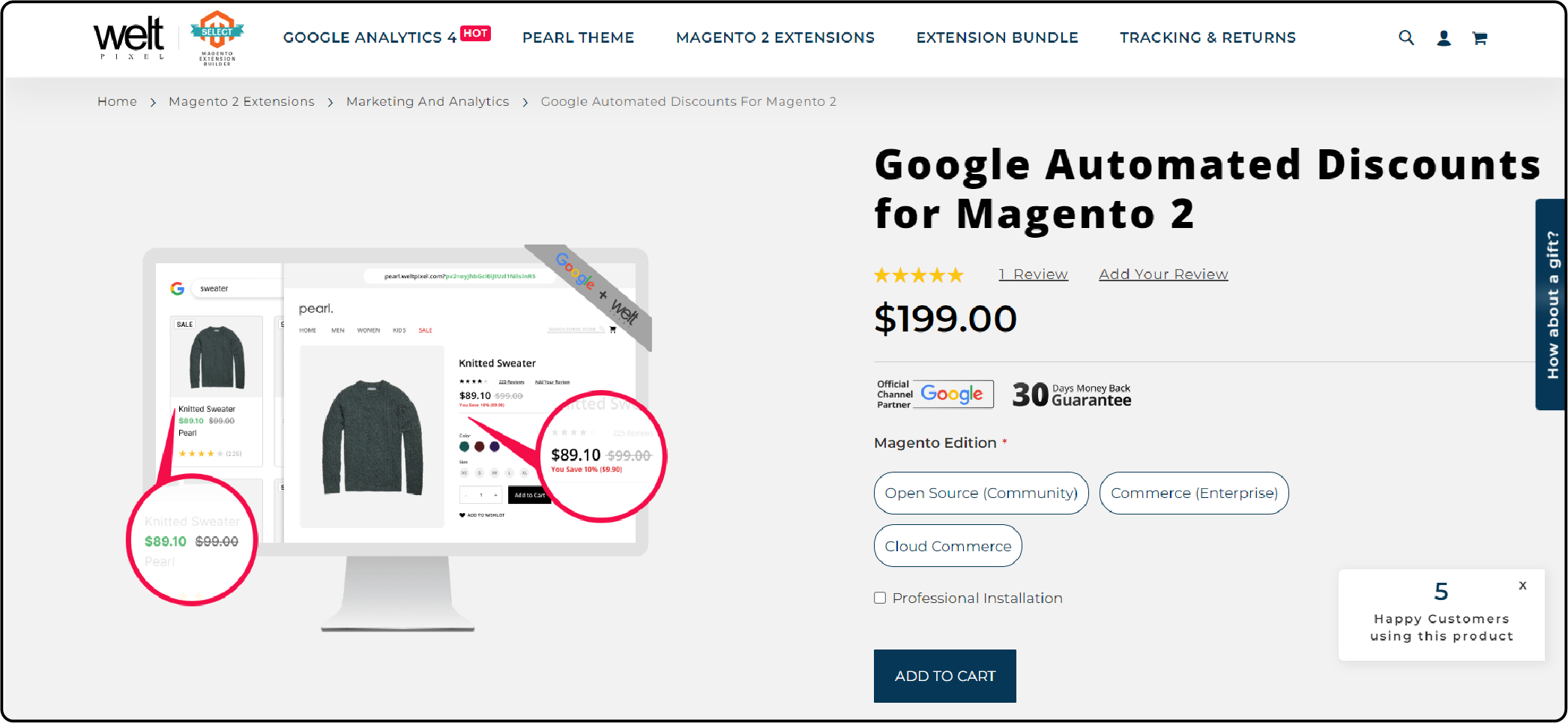
WeltPixel provides a dynamic pricing extension that offers:
-
Rule-based pricing
-
Tiered pricing
-
Time-based pricing features.
It allows merchants to create complex pricing rules using an intuitive interface. The extension also supports integration with other systems, such as:
-
ERP software
-
Analytics platforms.
Price:
-
Magento Open Source (Community) Edition: $199 (12 months)
-
Commerce (Enterprise) Edition: $399 (12 months)
-
Cloud Commerce Edition: $599 (12 months)
Who Needs Magento 2 Dynamic Pricing Extension?
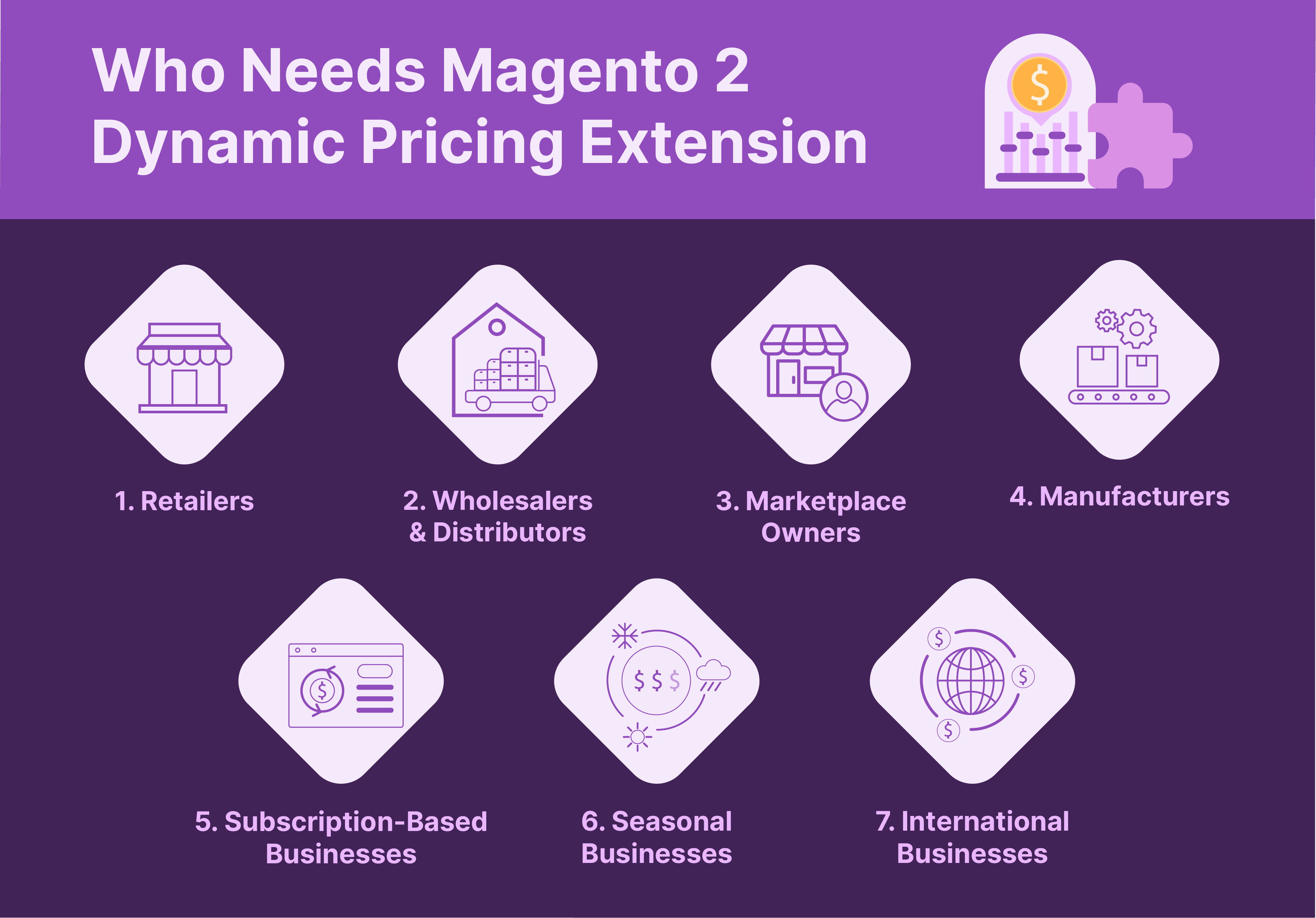
1. Retailers
Online retailers selling a wide range of products can use dynamic pricing. It helps them remain competitive in the ecommerce market. Retailers can attract more customers and increase sales by adjusting catalog prices. It is based on factors such as:
-
Demand
-
Competition
-
Customer behavior.
2. Wholesalers and Distributors
Wholesalers and distributors often deal with large volumes of products and customers. Dynamic pricing can help them offer personalized pricing to different customer segments.
It includes bulk discounts for wholesale customers or special pricing for loyal clients.
3. Marketplace Owners
Owners of online marketplaces with many sellers can use dynamic pricing. It helps them create a competitive environment among sellers.
It allows sellers to adjust their prices dynamically based on market conditions. It can attract more sellers and offer better prices to customers.
4. Manufacturers
Manufacturers selling products directly to consumers can use dynamic pricing. It helps them to optimize their pricing strategies. Manufacturers can maximize profitability and maintain market share by adjusting prices. The prices are adjusted based on factors such as:
-
Production cost
-
Demand forecasts
-
Competitor prices.
5. Subscription-Based Businesses
Businesses offering subscription-based services or products can use dynamic pricing. It helps them to tailor pricing plans to individual customer needs. Businesses can increase customer retention and lifetime value. They offer personalized pricing based on factors such as:
-
Usage patterns
-
Subscription history
6. Seasonal Businesses
Businesses that experience seasonal fluctuations in demand can use dynamic pricing. It helps them adjust prices during peak seasons or off-peak periods. It helps them offer discounts or promotions during slow periods.
It lets businesses attract more customers and maximize revenue throughout the year.
7. International Businesses
Businesses selling products internationally can use dynamic pricing. It helps them to adjust prices based on factors such as:
-
Currency exchange rates
-
Taxes
Offering localized pricing helps businesses improve customer experience. It also helps them expand their global reach.
Why is Magento 2 Dynamic Pricing Extension Required?
1. Competitive Pricing
With the increasing number of online stores, competition is getting tough. Dynamic pricing allows merchants to adjust prices in real time to remain competitive. Without such flexibility, businesses risk losing customers to competitors offering better prices.
2. Personalized Shopping Experience
Today's consumers expect personalized experiences. Dynamic pricing enables merchants to tailor prices based on:
-
Individual customer behavior
-
Demographics
It enhances customer satisfaction and loyalty.
3. Optimized Revenue and Profitability
Dynamic pricing empowers businesses to optimize revenue and profitability. It helps them adjust prices based on factors like:
-
Demand
-
Inventory levels
-
Market conditions.
It helps merchants maximize revenue while maintaining healthy profit margins.
4. Seasonal and Promotional Campaigns
Seasonal sales and promotions are integral to e-commerce success. Dynamic pricing allows merchants to schedule and automate price changes. The prices are automated for seasonal campaigns or flash sales. It helps drive urgency and enhances sales.
5. Inventory Management
Effective inventory management is required for e-commerce businesses. Dynamic pricing helps businesses manage inventory. It is done by adjusting prices to clear out excess stock or promote slow-moving items. It also helps reduce carrying costs and increase inventory turnover.
6. Market Intelligence and Flexibility
Dynamic pricing provides businesses with valuable market intelligence. It helps merchants track:
-
Competitor prices
-
Customer behavior
-
Market trends.
Merchants can make informed pricing decisions and adapt quickly to changing market conditions.
7. Customer Retention and Acquisition
Offering competitive prices and personalized discounts helps businesses attract and keep customers. Dynamic pricing allows merchants to reward loyal customers with special discounts. It also entices new customers with targeted promotions.
8. Internationalization
For businesses operating in many markets, dynamic pricing is needed for internationalization. Pricing strategies need to consider factors like:
-
Currency exchange rates
-
Taxes
-
Shipping costs.
It helps them offer competitive prices and enhance the global shopping experience.
FAQs
1. How does the extension calculate the price dynamically?
It uses a powerful algorithm for final price calculation within its dynamic pricing module. The price calculator for Magento 2 considers predefined rules like bulk purchase discounts, tiered pricing, or competitor prices. It helps ensure customers get personalized and competitive prices.
2. How can the base price be calculated for configurable products?
The extension calculates the price based on various factors, including the base price of the product and any additional modifiers. For configurable products, it considers the selected options like width or color. Then, it applies relevant pricing adjustments defined in the dynamic pricing calculator.
3. Is there a limit to the number of pricing rules I can configure?
You can configure an unlimited number of pricing rules and conditions on the backend of the extension. It will help suit your ecommerce store's requirements. It can include setting up tiered pricing for bulk purchases or offering personalized discounts.
4. Can the extension handle both configurable and simple products?
The extension integrates with both simple and configurable products. It ensures that dynamic pricing rules are applied accurately across your entire product catalog.
Summary
Magento 2 dynamic pricing extension offers advanced pricing strategies to enhance sales and profitability. The article also covers several other points, including:
-
It enables merchants to adjust prices based on factors like demand, competition, and customer segmentation.
-
The key features include rule-based pricing, tiered pricing, customer segmentation, and time-based pricing.
-
Various types of businesses can benefit from the extension, including retailers and wholesalers.
-
It helps businesses remain competitive and provide personalized shopping experiences.
Ready to take your Magento store to the next level with dynamic pricing? Enhance your Magento store experience even further with managed Magento hosting.


